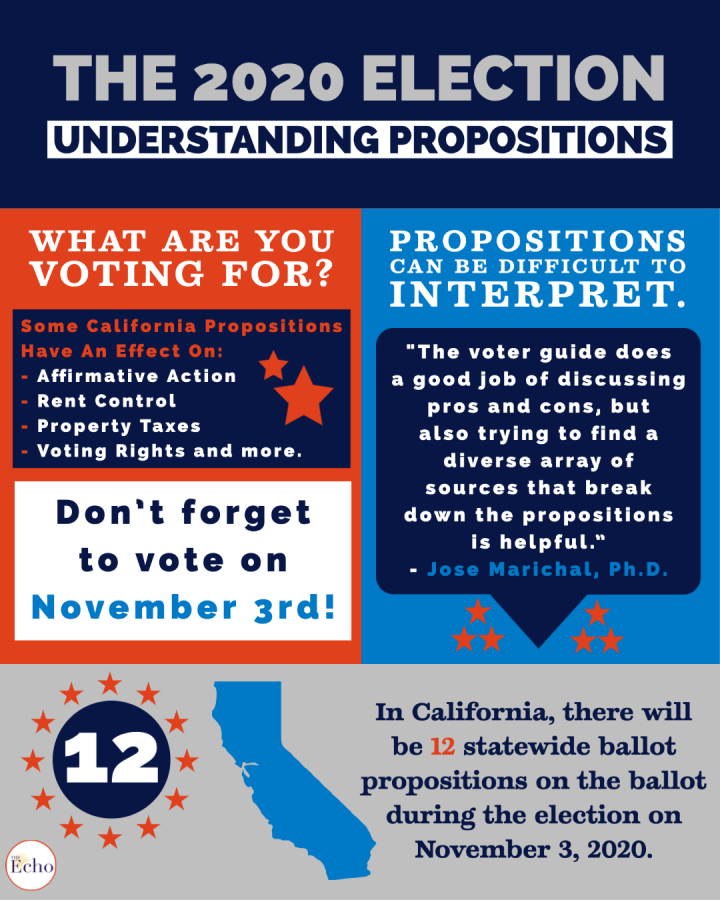California’s 12 Propositions on the ballot
October 23, 2020
California is one of nine states plus the District of Columbia that is allowing voting to be done primarily through mail-in ballots during the 2020 election.
There are 12 state measures appearing on California’s ballot for the Nov. 3 election. Below is a list explaining how your vote on each proposition will affect California residents.
Highlights
Proposition 16: This proposition will repeal Proposition 209 (1996), which states that government and public institutions “cannot discriminate against or grant preferential treatment to persons based on their race, sex, color, ethnicity or national origin in public employment, public education, and public contracting.”
- A “yes” vote supports the amendment to repeal the protections against discrimination or preferential treatment created by Proposition 209.
- A “no” vote will keep Proposition 209, and preserve anti-discrimination policies.
Proposition 18: An amendment to the state constitution that “will allow 17-year-olds who will be 18 at the time of the next general election to vote in primary and special elections.”
- A “yes” vote will support the constitutional amendment and grant 17-year-olds primary and special election voting rights.
Proposition 20: A state-initiated statute that deals with criminal sentencing and parole. The measure will also recategorize certain types of theft and fraud as wobblers—a crime that can be punished either as a felony or a misdemeanor—and would require a DNA test for certain misdemeanors.
- A “yes” vote will make theft and fraud crimes, including credit card fraud, car and firearm theft, chargeable as felonies.
- This proposition is important because it will classify some theft crimes that range from $250-$950 in value as felonies–punishable through federal prison time–instead of misdemeanors.
Propositions can be difficult to interpret and “sometimes confusing by design,” Jose Marichal, professor of Political Science at California Lutheran University, said.
“The [CLU Political Science Department] voter guide does a good job of discussing pros and cons, but also trying to find a diverse array of sources that break down the propositions is helpful,” Marichal said.
Below is a list outlining all 12 propositions.
Proposition 14: Permits the issuance of $5.5 billion in bonds for state stem cell research institutes.
- A “no” vote leaves private and non-profit entities to fund their own research.
- A “yes” vote allocated General Fund monies for bond debt service.
- A “yes” vote also expands state funding for stem cell research and therapies including:
- Alzheimer’s
- Parkinson’s
- Stroke
- Epilepsy and other central nervous system diseases and conditions.
Proposition 15: Requires commercial and industrial properties to be taxed based on their current market value, meaning it will be variable with the fluctuations in the market, rather than the price at purchase.
- A “no” vote would mean commercial and industrial properties will continue to be taxed based on “a property’s purchase price, with annual increases equal to the rate of inflation or 2 percent, whichever is lower.”
- A “yes” vote would mean taxation would reflect variance in market value.
Proposition 16: See above.
Proposition 17: Restores the right to vote to people convicted of felonies who are on parole.
- A “yes” vote supports the amendment to allow those with felony convictions on parole to vote.
Proposition 18: See above.
Proposition 19: Limits property tax increases on primary residences by removing location restrictions, including those in areas vulnerable to natural disaster.
- A “yes” vote would:
- Remove location restrictions on homeowners who are severely disable victims of wildfires or other natural disaster or seniors over 55 years of age.
- Require inherited homes not be used as secondary homes or vacation rentals, and be reassessed at market value when transferred.
Proposition 20: See above.
Proposition 21: The replacement of the 1995 Costa-Hawkins Rental Housing Act (Costa-Hawkins), with the “Rental Affordability Act.”
- A “yes” vote would permit cities and counties to implement their own rent control to “ensure renters can find and afford rental housing in their jurisdictions.”
- A “no” vote would maintain the Costa-Hawkins Act.
Proposition 22: This proposition would change the classification of app-based delivery service drivers from “employee” to “independent contractor.” This would allow drivers to control where, when, how long and for whom they work.
- A “yes” vote supports this ballot for app-based drivers to be considered independent contractors and have flexible schedules rather than mandatory shifts.
Proposition 23: An initiative to require chronic dialysis clinics to have an on-site physician while patients are being treated, report data on dialysis-related infections and not discriminate against patients based on the source of payment for care.
Proposition 24: A “yes” vote will expand states’ consumer privacy laws including conditions to allow consumers to prevent online servers from sharing personal information gathered for marketing purposes, remove the time period in which businesses can fix violations before being penalized and create the Privacy Protection Agency to enforce the state’s consumer data privacy laws.
Proposition 25: A “yes” vote will replace cash bail with risk assessments for detainees awaiting trial. California would be the first state to get rid of the cash bail system.
If you plan on returning your ballot by mail it must be postmarked on or before election day. If you plan on returning your ballot in person or drop box it must be delivered no later than 8 p.m. on Nov. 3.
California Lutheran University’s Lundring Events Center is an in-person voting location. All in-person voting locations in Ventura County will be open Saturday, Oct. 31, 10 a.m. to 6 p.m., Sunday Nov. 1, 10 a.m. to 6 p.m., Monday, Nov. 2, 10 a.m. 6 p.m., and Election Day, Tuesday, Nov. 3, 7 a.m. to 8 p.m.



